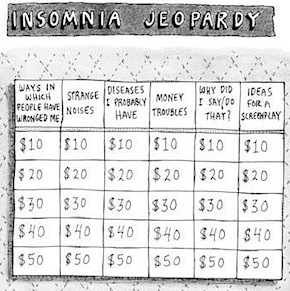
1. Buried in a weekender earlier this month, you may have seen the, er, shocking report of a study conducted at UVA (of all places!) that found that “People Prefer Electric Shocks to Being Alone With Their Thoughts.” If you dismissed it as classic social science clickbait, Lord knows you’d have our sympathy. But it would appear the findings were for real. In an article for The NY Times this week, Kate Murphy expanded on them substantially, folding in a number of our hobby horses along the way (compulsive busyness, over-distraction, Romans 7, even male underachievement), while curiously missing a golden opportunity to cite Blaise Pascal. You know – “All of humanity’s problems stem from mankind’s inability to sit in a quiet room alone.” The piece may not tell us anything we don’t already know, but man oh man if the evidence of universal addiction isn’t starting to mount. Maybe all this talk of an interventionist God isn’t so far-fetched after all, ht CB:
In 11 experiments involving more than 700 people, the majority of participants reported that they found it unpleasant to be alone in a room with their thoughts for just 6 to 15 minutes. Moreover, in one experiment, 64 percent of men and 15 percent of women began self-administering electric shocks when left alone to think. These same people, by the way, had previously said they would pay money to avoid receiving the painful jolt…
Human beings, when left alone, tend to dwell on what’s wrong in their lives… What preys on our minds, when we aren’t updating our Facebook page or in spinning class, are the things we haven’t figured out — difficult relationships, personal and professional failures, money trouble, health concerns and so on. And until there is resolution, or at least some kind of understanding or acceptance, these thoughts reverberate in our heads. Hello rumination. Hello insomnia…
“It’s like we’re all in this addicted family where all this busyness seems normal when it’s really harmful,” said Stephanie Brown, a psychologist in Silicon Valley and the author of “Speed: Facing Our Addiction to Fast and Faster — and Overcoming Our Fear of Slowing Down.” “There’s this widespread belief that thinking and feeling will only slow you down and get in your way, but it’s the opposite.”
Suppressing negative feelings only gives them more power, she said, leading to intrusive thoughts, which makes people get even busier to keep them at bay. The constant cognitive strain of evading emotions underlies a range of psychological troubles such as obsessive-compulsive disorder, anxiety, depression and panic attacks, not to mention a range of addictions. It is also associated with various somatic problems like eczema, irritable bowel syndrome, asthma, inflammation, impaired immunity and headaches.
2. On a somewhat related note, over at The Pacific Standard, Kyle Chayka took the release of the new Love Child documentary as an opportunity to ask “Does Internet Addiction Excuse the Death of an Infant?”, disclosing his own struggles with MMO addiction along the way (MMO = Massively Multiplayer Online game, e.g. World of Warcraft). This is, dare I say, an important issue that will only get more so, as the trailer below indicates:
3. If that’s too discouraging of a note to open with, you may find this interview with the headmistress of Oxford High School for Girls heartening. According to The Telegraph, Judith Carlisle “is on a crusade to stamp out perfectionism among her pupils (and in the staff room)”, and it would appear she’s actually putting her money where her mouth is. Of course, as much as the administrators talk about psychological health being the main motivator–and no doubt they’re being sincere–that hasn’t stopped them from defending their policies from the vantage point of higher ultimate performance as well (it is a school after all). The name of the initiative is priceless: “The Death of Little Miss Perfect.” Love it.
4. The Paris Review highlighted Cory Arcangel’s legitimately amusing new book, Working on My Novel, based on the twitterfeed of the same name that compiles various people’s announcements about how they’re, you guessed it, working on their novel (example: “I’m working on my novel again, and it feels good, you guys. I love my mind.”). A goldmine of self-justification to be sure, yet reviewer Dan Piepenbring sees something deeper going on:
It’s the story of what it means to live in a cultural climate that stifles almost every creative impulse, and why it so often seems we should stop trying. Arcangel suggests there’s something inherently ennobling in trying to write, but his book is an aggregate of delusion, narcissism, procrastination, boredom, self-congratulation, confusion—every stumbling block, in other words, between here and art. Working captures the worrisome extent to which creative writing has been synonymized with therapy; nearly everyone quoted in it pursues novel writing as a kind of exercise regimen…
It’s also a comment on the peculiar primacy the novel continues to enjoy—not as an artistic mode but as a kind of elevated diary, a form of what we insidiously refer to as “self-expression,” as if anyone’s self is static enough to survive transmission to the page. Not for nothing do we have Working on My Novel instead of Working on My Screenplay or Working on My Scrimshaw, because the novel, with its rich intellectual-emotional tradition and its (very occasional) commercial viability, is still perceived as the ideal vehicle for saying something ambitious. Even as fewer people read novels, we’re made to feel that writing one is a worthy, rigorous enterprise for serious thinking people, a means of proving that we have reservoirs of mindfulness and discipline deeper than our peers’. And so we try to write fiction, though certainly we don’t need to, and, as this book attests, we often don’t especially want to, even if we greet the task steeled by a perfect cup of coffee, a glass of red wine and a hot bath, or an Eminem song.
Have I mentioned that I’ve been working on a book of my own all summer? Now you know. Cue The Onion:
New Kindle Helps Readers Show Off By Shouting Title Of Book Loudly And Repeatedly
5. Those looking for an example of writing that is both worthy and beautiful need look no further than Michael Leary’s reflection on the suicide of his brother, “Losing the Thread.” Literary buffs will also find much to love in The Bitter Southerner’s project “Flannery O’Connor Walks Among Us Still.” And for those who appreciate the art of the eloquent takedown, they don’t get much better than Eleanor Robertson’s “Richard Dawkins, what on earth happened to you?” which contains more than a few memorable turns of phrase:
Sure, he wrote some pop science books back in the day, but why do we keep having him on TV and in the newspapers? If it’s a biologist you’re after, or a science communicator, why not pick from the hundreds out there who don’t tweet five or six Islamophobic sentiments before getting off the toilet in the morning? If you need an atheist, there are many philosophers, scholars of religion, and public intellectuals available who don’t refuse to acknowledge the existence of theology.
Dawkins has been arrogant for years, a man so convinced of his intellectual superiority that he believes the one domain in which he happens to be an expert, science, is the only legitimate way of acquiring or assessing knowledge. All of his outbursts in recent years follow from this belief: he understands the scientific method, a process intended to mitigate the interference of human subjectivity in data collection, as a universally applicable way of understanding not just the physical world but literally everything else as well. Hence his constant complaint that those appalled by his bigoted vituperations are simply offended by clarity; feeble-minded obscurantists who cling to emotion, tradition or the supernatural to shield themselves from the power of his truth bombs. You don’t have to be religious to find this level of hubris baffling.
6. As evidenced by the two videos adorning this post, The Onion’s social judgment think-tank division has been working overtime this past week. Also not to be missed is their “GlaxoSmithKline Releases New Drug To Treat People Who Just Feel Sort Of Weird Sometimes”, ht JD.
Maybelline Introduces New Ideal-Woman Rubber Mask To Use In Place Of Makeup
7. There’s been so much heartrending religious news this past week that it’s refreshing to read something as ostensibly positive as Foreign Policy’s exploration of Rwandan Pentecostalism, “The Woman Who Came Back From Hell.”
8. Finally, in music Prince’s Purple Rain hit theaters 30 years ago this weekend, believe it or not, and to commemorate, NPR did a wonderful piece on how “‘Purple Rain’ Taught Me How To Be In A Band”. The Artist’s one-time rival was featured in a terrific article on Slate by Tanner Colby, they beautifully titled “The Radical Notion of Michael Jackson’s Humanity.” A must-read. We’re getting ready for a slew of interesting releases in the coming months (Tweedy, Ryan Adams, Gaslight Anthem, Foxygen, Pink Floyd-!), but none of them is more shrouded in mystery than Bob Dylan’s Shadows in the Night. The Vulture took an extended look at “How Did Bob Dylan Get So Weird?” that’s definitely worth your time, even if it adheres to the (largely untrue) party line about his Gospel period, omitting much/any reference to the blatant spirituality that informs much of his ‘weirdness’. Oh well. At least there’s more God Help The Girl goodness this week! Could not be more excited about this:
https://www.youtube.com/watch?v=E8KrudHYcSo&w=600

COMMENTS
Leave a Reply













